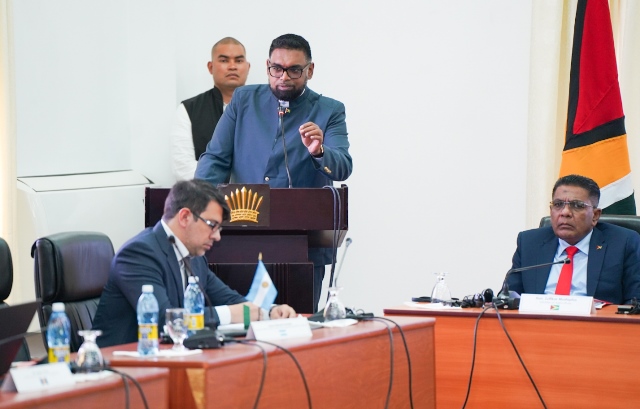Reducing poverty, inequalities is key to achieving food security
–President Ali
Steadfast in his food security agenda within the Caribbean and Latin America, President Dr Mohamed Irfaan Ali on Tuesday, underscored the importance of enhancing food production and integrating food security objectives with reducing poverty and inequality.
“We can’t speak about nutrition in the region and food security if we don’t also bring into the discourse, a poverty reduction strategy and reducing inequalities,” President Ali said.

The Guyanese head-of-state was addressing the Community of Latin American and Caribbean States (CELAC) high-level Ministers of Agriculture meeting held at the Arthur Chung Conference Centre (ACCC) in Liliendaal.
The event brings together leaders and stakeholders from 33 CELAC countries to address the crucial matters of food and nutrition security in the region.
President Ali said that to comprehensively address the issues, policymakers and stakeholders must confront matters of climate change, improving the education and healthcare systems, as well as sustainable development.
He further noted that the lack of support from international funding agencies, commercial banks, and monetary institutions in financing agriculture must also be addressed.
“Food production and nutrition is about good health and good health and food production is about national prosperity. And national prosperity is about national security,” President Ali explained.
President Ali underlined the importance of a health sector that understands its role in ensuring food and nutrition security. He noted that a crucial objective of the meeting should be to define the specific responsibilities of the health sector in each country to achieve this goal.
The role of education must also be addressed by integrating nutritional changes into the education system, starting from nursery through university, he said.

“We must produce the action plan. We are not here to dwell on the problems…you are here as the policymakers to craft policy in a regional setting by learning from each other,” he told the participants.
The president also acknowledged the need for establishing a technological support system within the region to enhance food production, with a particular focus on empowering women in this sector.
He mentioned that the Government of Guyana has set a target of ensuring that 35% of livestock farms are owned by women as part of efforts to develop the livestock industry.
At the regional level, the president said a project was launched that involves the use of greenhouse and hydroponics. This forms part of efforts to boost food production across the Caribbean Community (CARICOM) to achieve the 25 by 2025 target which is, lowering the food import bill.
Statistics show that between 2019 and 2021, the number of hungry people in the region increased by 13.2 million, higher than the global average. Therefore, President Ali stressed the need for CELAC as a region, to implement an aggressive programme that actively engages young people and women.
Guyana’s Minister of Agriculture, Zulfikar Mustapha and St. Vincent and the Grenadine’s Minister of Agriculture, Forestry, Fisheries, Rural Transformation, Industry & Labour, Saboto Caesar also delivered remarks at the event.

